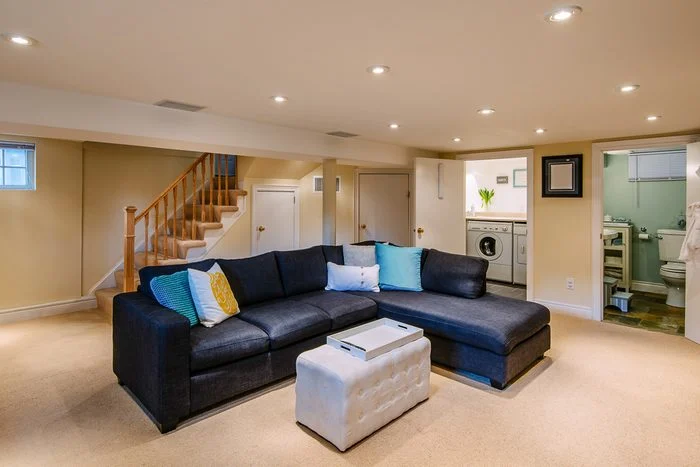Richmond homeowners, have you ever looked down at your basement and seen nothing but storage boxes or a dark, underused space? What if that same area could become a stylish guest suite, media room, or rental unit — and at the same time, significantly raise your home’s value? Whether you’re staying put or preparing to sell, transforming your basement is one of the most innovative renovations you can do. With data from Realtor associations, appraisal experts, and home building studies, this article will guide you through how to turn that underutilized space in Richmond into a high-return, livable gem.
1. Why Basement Conversions Rank High for Return on Investment
- According to the National Association of Realtors® (NAR) and the National Association of the Remodeling Industry (NARI), converting an unfinished basement into living space can recoup about 86% of the cost on average when you sell.
- In Remodeling’s Cost vs. Value Report, basement remodels are repeatedly among the top projects with high resale value, often outperforming many bathroom or kitchen upgrades in terms of cost recovery.
- Appraisers and inspection associations agree: finished basements add square footage, and although below-grade space may be valued less per square foot than above-grade space, it still boosts overall living space and appeal.
2. Understanding the Costs & What Influences Them
- According to Element Homes, the cost to finish a basement typically ranges from US$30 to US$75 per square foot, depending on location, finishes, structural or waterproofing work, and whether plumbing or specialized features are added.
- Major cost drivers include:
- Waterproofing and moisture control – essential in basements to prevent mold & damage.
- Structural changes & code compliance – window wells, egress windows, ceiling height, electrical/plumbing upgrades.
- Finish quality – flooring, cabinetry, fixtures, lighting, built-ins, etc. The more upscale the materials, the higher the cost and the potential for more value.
- Waterproofing and moisture control – essential in basements to prevent mold & damage.
3. Local Richmond Factors to Consider
- Richmond’s climate means moisture and humidity are real concerns — good waterproofing and possibly basement drainage will be more than cosmetic; they safeguard the investment.
- Building permits, inspections, and local code requirements (e.g. egress windows, ceiling height) are enforced by Virginia state boards and City/County authorities; non-conforming spaces may not be counted as part of official living area.
- Also, the local real estate market (Richmond area) determines how much buyers value additional below-grade space. If many homes in your neighborhood already have finished basements, the added value might be less dramatic; in neighborhoods without finished basements, yours might stand out.
4. Design Ideas That Add Both Livability & Value
- Multi-purpose layouts: guest suite with a bathroom, home office, media/night room — flexibility appeals to a broader pool of buyers and renters.
- Natural light and open design: Light wells, larger windows (where allowed), and well-placed lighting help overcome the “basement” stigma of being dark or cramped.
- Energy efficiency and insulation: Good insulation, efficient HVAC extension, and moisture barriers will reduce ongoing maintenance and utility costs — factors that show up in appraisals and inspections.
- Compliance and safety: egress, ceiling height, fire safety, and heat/ventilation aren’t optional if you want value.
5. Working with Professionals & Marketing the Renovation
- Engage with appraiser or inspector associations early to understand what features are needed in your area to maximize value.
- Hire contractors familiar with local building codes and who can obtain necessary permits. Ignoring permitting or structural requirements often results in cost overruns.
- When you renovate, ensure you document everything (dates, materials, warranties) — helpful when you or someone else sells.
- If selling, partner with top real estate agents in Richmond; they can highlight your finished basement in listings (especially if staged well) and understand how buyers perceive added living space. And if you’re thinking of a quick sale, companies that do “We Buy Houses Richmond” should also be aware that homes with well-finished basements tend to command better prices.
Conclusion
Turning your Richmond basement into a livable space is more than just aesthetic; it’s a wise investment. From data by NAR/NARI showing up to ~86% cost-recovery, to appraisal guidelines that count safe, finished space as real value — the benefit is clear. Start by knowing your costs, factoring in local codes and utilities, choose designs that balance functionality and appeal, and work with professionals who understand Richmond. Whether you stay in your home or place it on the market, a finished basement can deliver significant returns. If you plan carefully, that dark, cold space under the stairs can become one of your home’s most valuable assets.






